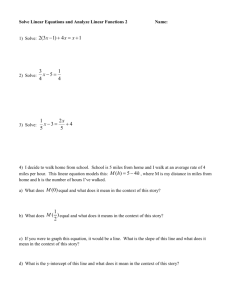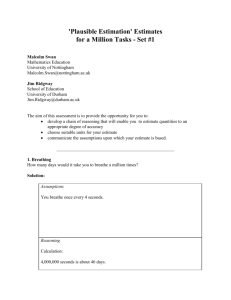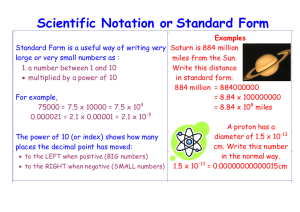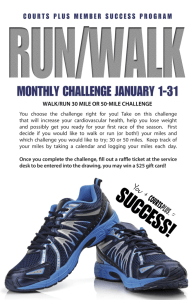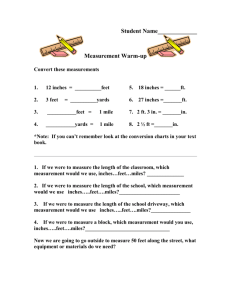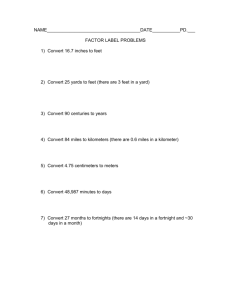Pathways Precalculus Exam Questions (Module 2 3)
advertisement
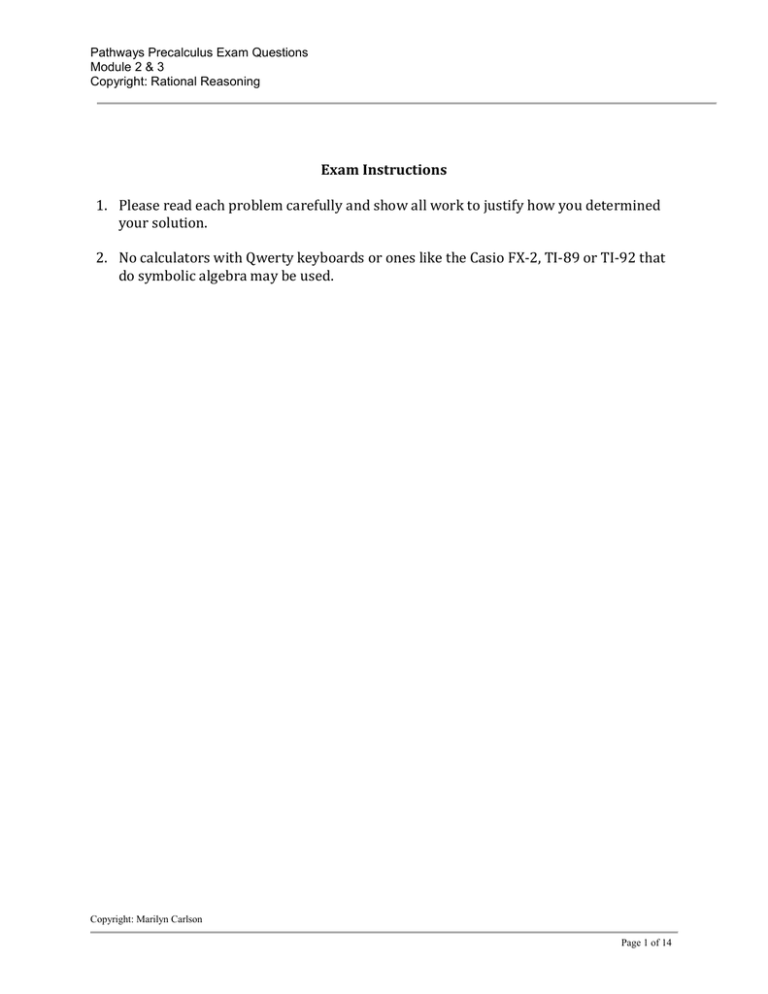
Pathways Precalculus Exam Questions Module 2 & 3 Copyright: Rational Reasoning Exam Instructions 1. Please read each problem carefully and show all work to justify how you determined your solution. 2. No calculators with Qwerty keyboards or ones like the Casio FX-2, TI-89 or TI-92 that do symbolic algebra may be used. Copyright: Marilyn Carlson Page 1 of 14 Pathways Precalculus Exam Questions Module 2 & 3 Copyright: Rational Reasoning 1. A golf cart travels at a constant rate covering 7 yards every 2 seconds. As Kevin drove this golf cart from the second hole to the third tee what distance did he travel over a 5 second period of time? a. 7.5 yards yards b. 10 yards c. 14 yards d. 17.5 yards e. 35 2. According to the product recommendation, a full 32 oz. bottle of a liquid fertilizer should be applied evenly over 48 ft2 of garden space. Let A be the area of the garden in ft2, and n be the number of oz. of fertilizer. Which of the following defines a function that determines the number of oz. of fertilizer needed as a function of the area of garden space? 32 a. A = f (n) = n 48 32 b. n = f (A) = A 48 48 c. A = f (n) = n 32 48 d. n = f (A) = A 32 e. None of the above 3. Katie swims at a constant rate of 42 meters per minute as she swims laps in a pool. Which of the following describes a varying quantity in this situation? a. b. c. d. e. The speed Katie swam in meters per hour since she started swimming The amount of time elapsed in minutes since Katie began swimming The number of breaths Katie took during her first lap The amount of time it took Katie to swim one lap None of the above 4. A 10-inch candle burns 1.2 inches per hour. If h = the number of hours that the candle has been burning and L = 10 – 1.2h, what does the variable L represent in this formula? a. L = the difference between the length of the candle and the rate at which the candle is burning b. L = the length of the candle in inches that remains since the candle started burning c. L = the final length of the burning candle in inches d. L = the number of inches that has burned from the candle after h hours e. L = the length of the part of the candle that has burned in inches Copyright: Marilyn Carlson Page 2 of 14 Pathways Precalculus Exam Questions Module 2 & 3 Copyright: Rational Reasoning (Use the following statement to answer questions 5, 6 & 7) Michael cycles along a stretch of a cycling path at a constant rate of 29 ft/sec. 5. How many feet does Michael travel in 5.8 seconds? a. 0.2 b. 5 c. 34.8 d. 129.5 e. None of the above 6. How many seconds (rounded to the nearest tenth) will it take for Michael to travel 110 feet? a. 3.1 sec b. 3.8 sec c. 4.5 sec d. 5.2 sec e. None of the above 7. Which formula determines Michael’s distance d from a milepost (in feet) in terms of the amount of time t (in seconds) since Michael passed the milepost? a. d = t + 29 b. t = d + 29 c. d = 29t d. t = 29d e. None of the above 8. Millie ran at a constant speed of 3 miles per hour as she ran 4 laps on a track. Which of the following describes a varying quantity in this situation? a. The distance of one lap b. The elapsed time since Millie began running c. The number of laps Millie had run when she was finished running d. The speed that Millie was running e. The time it took Millie to run one lap. 9. Suppose r changes at a constant rate of 2.5 with respect to p. What does this mean for any change in p? a. b. c. d. e. The change in p is increasing at a constant rate of 2.5 The change in r is always 2.5 times more than the change in p The change in p is always 2.5 times more than the change in r The change in r is always 2.5 times as much as the change in p The change in p is always 2.5 times as much as the change in r Copyright: Marilyn Carlson Page 3 of 14 Pathways Precalculus Exam Questions Module 2 & 3 Copyright: Rational Reasoning 10. Jim walks at 5 feet per second and Lee walks at 3.5 feet per second. If Jim and Lee are walking in the same direction and Jim starts walking when Lee is 45 feet ahead of him, what is the situation 20 seconds after Jim starts walking? a. b. c. d. f. Jim is ahead by 70 feet. Lee is ahead by 70 feet. Lee is ahead by 15 feet. Jim is ahead by 15 feet. Jim and Lee are at the same point 11. Jim rides his bike at a constant rate of change 21.5 miles per hour as he travels from his home to a coffee shop. Read all five options and select the one that includes all correct answers. a. The number of miles Jim travels is always 21.5 times as large as the number of hours Jim rides. b. If Jim rides ½ of one hour he will ride ½ of 21.5 miles. c. For every 1 hour of elapsed time Jim travels a distance of 21.5 miles. d. All of the above e. A and C only 12. After completing a pit stop, a racecar pulls back onto the racetrack. Let f (t) be the distance of the racecar t seconds since leaving the pit. What is the meaning of f(5) – f(3)? a. The distance traveled by the car from t = 3 to t = 5 seconds since leaving the pit b. The average speed of the car from t = 3 to t = 5 seconds since leaving the pit c. The increase in speed as the car moved from the 3 m mark to the 5 m mark d. The average speed of the car as the car moved from the 3 m mark to the 5 m mark e. The time elapsed as the car moved from the 3 m mark to the 5 m mark 13. A spherical snowball originally has a radius of 8 cm. As it melts the radius decreases at a rate of 0.6 cm/minute. Which of the following defines the volume of the snowball (in cm3) as a function of the amount of time (in minutes) since the snowball began melting? 4 (Recall that the volume of a sphere is determined by V = p r 3). 3 a. g(t) = 8 - 0.6t 4 b. g(t) = p r 3t 3 4 c. g(t) = p 8 - 0.6t 3 3 4 3 d. g(t) = p ( 8 - 0.6t ) 3 4 e. g(r) = p r 3 3 ( ) Copyright: Marilyn Carlson Page 4 of 14 Pathways Precalculus Exam Questions Module 2 & 3 Copyright: Rational Reasoning 14. Suppose you determine the average speed of this racecar over the interval t = 1 to t = 4 sec. Which statement best describes the meaning of average speed in this context? a. The sum of the initial and final speeds divided by 2 b. The speed that the racecar drove most of the time. c. The constant speed that the racecar traveled during the 3 seconds. d. The constant speed needed to travel the same distance as the racecar in the same amount of time (3 seconds). e. The sum of the distances at t = 1,2,3,4 divided by 4 15. The graph below represents the number of points scored by a basketball team, P, as a function of the number of minutes after the start of the game. Evaluate P(15) and explain its meaning. a. P(15) = 10; Fifteen minutes after the start of the game the team had scored 10 points. b. P(15) = 10; Ten minutes after the start of the game the team had scored 15 points. c. P(15) = 20; Fifteen minutes after the start of the game the team had scored 20 points. d. P(15) = 20; Twenty minutes after the start of the game the team had scored 15 points. e. P(15) = 8; Fifteen minutes after the start of the game the team had scored 8 points. Copyright: Marilyn Carlson Page 5 of 14 Pathways Precalculus Exam Questions Module 2 & 3 Copyright: Rational Reasoning 16. A word processor determines the width of the body of text on a page for a margin setting of x inches. If the page is originally 8.5 inches wide and has two equal size margins on each side, which formula determines the width of the body of the text in terms of the margin setting x? a. w = 2x - 8.5 b. w = x - 8.5 c. w = 8.5 - 2x d. w = 8.5 - x e. w = 2x 17. The variables x and y in the table below are in a linear relationship. What is the value of y when x is 9? a. b. c. d. e. 0 7 1 –1 –4 x 1 3 9 12 y 15 11 –7 18. If S(m) represents the salary (per month), in hundreds of dollars, of an employee after m months on the job, what would the function R(m) = S(m + 12) represent? a. b. c. d. e. The salary of an employee after 12 months on the job. $12 more than the salary of someone who has worked for m months. An employee who has worked for m + 12 months. The salary of an employee after m + 12 months on the job. Not enough information. Use the graphs of f and g to answer items 18 and 19. 19. Use the graphs of f and g to evaluate g ( f ( 2 )) . a. b. c. d. e. –2 1 3 4 Not defined 20. Evaluate f ( 2 ) - g ( 0 ) . a. -4 b. -2 c. 0 d. 2 e. 4 Copyright: Marilyn Carlson Page 6 of 14 Pathways Precalculus Exam Questions Module 2 & 3 Copyright: Rational Reasoning 21. Let S(m) represents the salary (per month), in hundreds of dollars, of an employee after m months on the job. What does the solution to the equation S(m) = 23 represent? a. The salary of an employee after 23 months on the job. b. The monthly salary of the employee is 23. c. The number of months it would take for an employee to earn a salary of $2,300 per month. d. The monthly salary of the employee is $2,300. e. The number of months it would take for an employee to earn a salary of $23 per hour. 2 22. Given the function h( x ) = 3x -1 and g( x ) = x , evaluate g( h(2)) . a. 10 b. 11 c. 20 d. 25 e. 36 23. Given that f(1) = 6 and f(5) = 14, what is the average rate of change of f on the interval from x = 1 to x = 5. a. 10 c. 8 c. 2 d. 4 e. 6 x2 ? 24. What is the domain of the following function: f x x 1 a. x > 1 b. x 1 c. x > -2 and x ¹ 1 d. x > -2 e. All real numbers 25. At 5:00 am Maria leaves a gas station and drives on I-70 toward Denver at a constant rate of 40 miles per hour. At 5:30 am Robert leaves the same gas station and also drives on I-70 towards Denver at a constant rate of 60 miles per hour. At 6:00 am how far apart are Maria and Robert? a. 0 miles b. 10 miles c. 20 miles d. 30 miles e. 40 miles Copyright: Marilyn Carlson Page 7 of 14 Pathways Precalculus Exam Questions Module 2 & 3 Copyright: Rational Reasoning 26. Given that Q 5 P 10 , which of the following is correct? a. P = 1 5Q + 10 1 b. P = Q -10 5 c. 1 P = Q-2 5 1 d. P = Q +10 5 27. Two cars that are originally 216 miles apart start traveling toward one another at 9 am. One car travels 62 miles per hour and the other travels 68 miles per hour, both with their cruise control on. Which formula represents d, the distance between the two cars t hours after 9 am. a. d = 62t 68t b. d = 216 - 62t c. d = 68t 62t d. d = 216 (68t 62t ) e. d = 216 + (68t + 62t) 28. Suppose M(g) represents the cost in dollars of manufacturing g number of SUVs. Which statement best reflects what M -1 ( 900000 ) represents? a. The number of SUVs manufactured is 900,000. b. The number of SUVs that can be manufactured for $900,000. c. The profit in dollars from making 900,000 SUVs. d. The inverse cost to manufacture 900,000 SUVs. e. One over the cost to manufacture 900,000 SUVs. 29. Suppose the function g represents the cost of a new Nissan Altima t years since 1987. What does the expression 5g ( 4 ) represent? a. A 4 year time span for 5 Nissan Altimas b. The cost of 5 Nissan Altimas in 1991 c. The cost of 5 Nissan Altimas in 1987 d. 4 times the cost of 5 Nissan Altima’s in 1987 e. A quantity of 5 Nissan Altimas in 1991 Copyright: Marilyn Carlson Page 8 of 14 Pathways Precalculus Exam Questions Module 2 & 3 Copyright: Rational Reasoning 30. What is the meaning of f(5) – f(3)? a. The distance traveled by the car from t = 3 to t = 5 seconds b. The average speed of the car from t = 3 to t = 5 seconds c. The increase in speed as the car moved from the 3 m mark to the 5 m mark d. The average speed of the car as the car moved from the 3 m mark to the 5 m mark e. The time elapsed as the car moved from the 3 m mark to the 5 m mark 31. If the length of the side of a square s varies from 0 to 4 inches, how does the perimeter p of the square vary? a. from 0 to 4 inches b. from 1 to 4 inches c. from 4 to 8 inches d. from 0 to 12 inches e. from 0 to 16 inches 32. Solve the equation 4x - 3 = 7 for x. a. x = 2.5 b. x = –1, x = 2.5 c. x = 10 d. x = –1, x = 10 e. x = 1, x = 2.5 33. Solve the inequality -3x - 6 £ 18 for x. a. -8 £ x £ 4 b. 4 £ x £ -8 c. x ³ 4 or x £ -8 d. x ³ -8 e. None of these. 34. Solve the inequality a. b. c. d. e. 4 3 1 (3a - 7) - < for a. 7 4 4 7 24 7 a³24 35 a³ 12 35 a£ 12 35 a£12 a£- Copyright: Marilyn Carlson Page 9 of 14 Pathways Precalculus Exam Questions Module 2 & 3 Copyright: Rational Reasoning -1 35. Use the table of the function given to determine the value of f (4) when y = f (x). a. –3 1 b. 3 1 c. 2 d. 2 e. 3 x –4 2 4 9 y 5 4 –3 –4 36. Given that a function has a constant rate of change of 3.2 and passes through the point (2, 4.3), what is the value of y when x = –1.4? a. b. c. d. e. –16.24 –6.58 –2.48 –0.18 6.22 37. Given that a linear function passes through the points (3, 2) and (–2.2, 6), determine the formula of the function. 10 a. f (x) = - (x - 2.2) + 6 13 10 b. f (x) = - (x + 2.2) + 6 13 13 c. f (x) = - (x - 2.2) - 6 10 13 d. f (x) = - (x - 2.2) + 6 10 10 e. f (x) = - (x + 2.2) - 6 13 49 38 Write 5x using radical notation. (Assume that all variables represent positive real numbers.) a. 4 5x 9 9 4 b. 5 x c. 9 5x 4 4 9 d. 5 x 39. Which of the following functions is the inverse of the function f x 3x 1 ? a. g x x 1 3 1 1 b. g x x 3 3 Copyright: Marilyn Carlson Page 10 of 14 Pathways Precalculus Exam Questions Module 2 & 3 Copyright: Rational Reasoning c. g x 3x 1 3 d. 1 1 g x x 3 3 2 40. Multiply: x 4 x x 4 3 2 a. x x 16 3 2 b. x 5 x 8 x 16 3 2 c. x 3 x 8 x 16 3 2 d. x 5 x 16 2 41. If f ( x) 3x 4 and g ( x) x 1 what is g f ( x) ? 2 a. 9 x 24 x 17 2 b. 9 x 12 x 17 Error! Digit expected. 2 c. 3 x 1 2 d. 9 x 17 42. Let f(t) be the distance in miles a car has traveled t minutes since passing the Arizona state line. The distance f(t) is a function of the time t and is represented by f ( t ) = 0.018t 2 +1.07t . What is the meaning of f (14 ) - f ( 9 )? a. The distance the car traveled as the time since the car passed the Arizona state line increased from t = 9 to t =14 minutes. b. The distance of 5 miles the car traveled after 14 minutes. c. The average speed of the car from t = 9 to t = 14 minutes since the car passed the Arizona state line. d. The average speed of the car as it moved from 9 miles to 14 miles past the Arizona state line. e. None of the above 43. Which of the following formulas defines the area, A, of a circle as a function of its circumference, C? C2 C2 A a. A b. c. A (2 r )2 d. A r 2 2 4 Copyright: Marilyn Carlson Page 11 of 14 Pathways Precalculus Exam Questions Module 2 & 3 Copyright: Rational Reasoning Open-Ended Questions– Show all work and explain all answers thoroughly on this exam. Be sure to define variables where needed. 27. A large spool is used to hold rope that is wound around the spool. The more rope wound around the spool, the greater the combined weight of the spool and rope. The graph below shows that when 5 feet of rope is wound around the spool, the total weight of the spool and rope is 3.95 pounds. Note that the rope weighs 0.27 pounds per foot. a. Suppose the number of feet of rope on the spool increases from the given point to 8.4 feet. What is the change in the number of feet of rope on the spool? b. Represent this change on the graph above. Explain the thinking you used to represent this change. c. What is the total weight of the spool and rope when there are 8.4 feet of rope on the spool? Explain how you determined your answer. d. What is the weight of the spool without any rope? Explain how you determined this value and represent your reasoning on the graph above. Copyright: Marilyn Carlson Page 12 of 14 Pathways Precalculus Exam Questions Module 2 & 3 Copyright: Rational Reasoning 28. A 3 m x 1.5 m piece of plywood is being used to build an open-top toy chest. The chest is formed by making equal-sized square cutouts from two corners of the plywood at the ends of a 3-meter side. After these squares are discarded, three more cuts are made (at the dashed lines on the figure) and these pieces are “folded up” and secured to create three of the four vertical sides. When the open side is placed against a wall, the open top toy chest is formed. Neglect the thickness of the wood when answering these questions. a. If the variable x represents the length of the sides of the square cutouts in meters, define a function f that expresses the volume of the toy chest (in cubic meters) as a function of the length of the side of the square cutouts, x. b. What are the possible values that x can assume in the context of this problem? c. As the length of the side of the square cutout increases from 0.5 meters to 0.75 meters, how does the volume of the toy chest change? (You do not need to calculate the answer. You may just write the expression that you would use to calculate the answer.) Copyright: Marilyn Carlson Page 13 of 14 Pathways Precalculus Exam Questions Module 2 & 3 Copyright: Rational Reasoning Copyright: Marilyn Carlson Page 14 of 14
